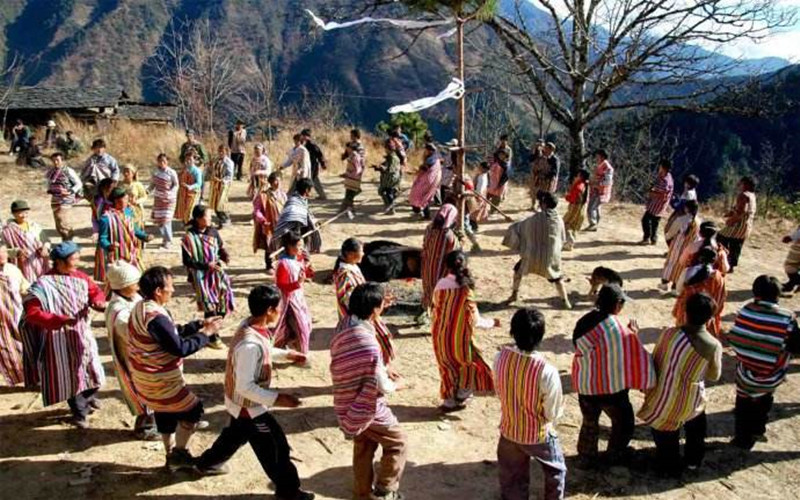 alt="Puer Surrounding Counties and Towns: Weekly & Special Local Markets Travel Guide"
/>
alt="Puer Surrounding Counties and Towns: Weekly & Special Local Markets Travel Guide"
/>
Kaquewa Festival of Dulong Ethnic Minority
Brief Introduction
Kaquewa Festival(卡雀瓦节) of Dulong Ethnic Minority(独龙族) spreads in Dulong villages(独龙寨)in the Dulong River Valley (独龙河流域)in the west of Gongshan Dulong Nu Autonomous County(贡山独龙族怒族自治县), Nujiang Lisu Autonomous Prefecture(怒江傈僳族自治州).
Kakuwa Festival is the only festival of Dulong ethnic groups in a year. The Dulong ethnic groups believe that their gods are Gemeng(格孟) and La(拉). They believe that they can protect people from disease and danger and give them long lives. Therefore, Dulong ethnic people hold a festival of Gemeng and La once a year, that is, the celebration of New Year.
Cultural Function
Kaquewa Festival not only carries the traditional features of Dulong ethnic history, culture and art, but also its unique traditional calendar is a cultural element of great scientific significance, which has important historical and ethnological research value.

Date
There is no uniform time for Kaquewa Festival, but it is usually arranged between Toutilong(投提龙) and Deriganlong(德日甘龙) in the Dulong traditional calendar, that is, between December and January of the following year, with a period of 3-9 days.
Activities
The activities of the Kaquewa Festival includes woodcut messengers(木刻传信), Tiaoguozhuang(跳锅庄), shooting animals’ models(射击动物模型), burning pine leaves in a fire pond(火塘稍松叶) for auspiciousness, drinking mulo wine(喝木罗酒) and killing cattle(剽牛), etc. Families invite friends to come to celebrate the festival by means of woodcut messengers. A few notches in the woodcut indicate that a celebration ceremony will be held in a few days. Invitees will take all kinds of food with them on time to congratulate each other.
On the first day, the guests and hosts drank wine, sang to each other. At night, the whole village gathered around the campfire to taste food. Young men and women danced in the pot farm to celebrate the New Year. On the second day, some villages will hold hunting celebrations. The people are singing and dancing in a circle. On the third day, families burned pine leaves in the fire pond to pray for their family’s safety and auspiciousness in the coming year. On the fourth day, the whole village gathered for a drink of mulo, singing and dancing till late at night. On the fifth day, everyone ate and drank until the sun set, and the Kaquewa Festival ended.
In the whole festival activities, the most solemn is the celestial activities of killing cattle. When killing cattle, the men and women of the village surrounded the cattle in a big circle, and danced with the rhythm of gongs(锣). The festivals of the villages are successive, and the villages living in the upper reaches of Dulong River are the first to open the festival season. From the upper reaches to the lower villages, they enter the festival in sequence. The whole Dulong River Valley’s Kaquewa celebration lasts for one month. Generally, villages celebrate the festival collectively, sometimes with several neighboring villages.

 7 Days GolfingTour
7 Days GolfingTour
 8 Days Group Tour
8 Days Group Tour
 8 Days Yunnan Tour
8 Days Yunnan Tour
 7 Days Shangri La Hiking
7 Days Shangri La Hiking
 11 Days Yunnan Tour
11 Days Yunnan Tour
 6 Days Yuanyang Terraces
6 Days Yuanyang Terraces
 11 Days Yunnan Tour
11 Days Yunnan Tour
 8 Days South Yunnan
8 Days South Yunnan
 7 Days Tea Tour
7 Days Tea Tour
 8 Days Muslim Tour
8 Days Muslim Tour
 12 Days Self-Driving
12 Days Self-Driving
 4 Days Haba Climbing
4 Days Haba Climbing
 Tiger Leaping Gorge
Tiger Leaping Gorge
 Stone Forest
Stone Forest
 Yunnan-Tibet
Yunnan-Tibet
 Hani Rice Terraces
Hani Rice Terraces
 Kunming
Kunming
 Lijiang
Lijiang
 Shangri-la
Shangri-la
 Dali
Dali
 XishuangBanna
XishuangBanna
 Honghe
Honghe
 Kunming
Kunming
 Lijiang
Lijiang
 Shangri-la
Shangri-la
 Yuanyang Rice Terraces
Yuanyang Rice Terraces
 Nujiang
Nujiang
 XishuangBanna
XishuangBanna
 Spring City Golf
Spring City Golf
 Snow Mountain Golf
Snow Mountain Golf
 Stone Mountain Golf
Stone Mountain Golf













 What Our Customers Say?
What Our Customers Say?
